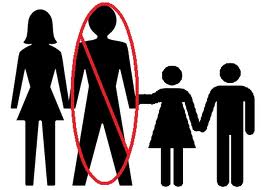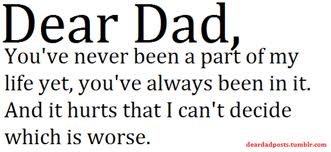 American fathers are more removed from family life today than in any other time in American history. There are two reasons for this recent outbreak of fatherless families: recent research suggests that a sharp increase in the divorce rate and the fact that it is more socially acceptable for women to conceive children outside of marriage are the reasons why fathers are not in the lives of their children. Fathers leave for many reasons. These reasons can range from repeating the cycle of their own fatherless childhoods, to low self-esteem, and the desire to start a new life with another woman who does not desire his “baggage.” Whatever the reason may be, the effects of not having another father leave a scar on a child for the remainder of his or her life.
American fathers are more removed from family life today than in any other time in American history. There are two reasons for this recent outbreak of fatherless families: recent research suggests that a sharp increase in the divorce rate and the fact that it is more socially acceptable for women to conceive children outside of marriage are the reasons why fathers are not in the lives of their children. Fathers leave for many reasons. These reasons can range from repeating the cycle of their own fatherless childhoods, to low self-esteem, and the desire to start a new life with another woman who does not desire his “baggage.” Whatever the reason may be, the effects of not having another father leave a scar on a child for the remainder of his or her life.
Families without fathers in their household suffer in many ways. One of the universal effects on children when a father abandons his family is a decreased standard of living. Children with a missing father are five times more likely to be poor. Statistics show that the household incomes of divorced or separated families instantly decline by about twenty-one percent on average and will remain in a steady decline afterwards. The main breadwinner is now the mother who usually earns considerably less than the father did. The courts can award child support but it is usually not enough to maintain the same standard of living.
In the case of unmarried mothers, the financial picture is usually worse. Single mothers start out with only one income, usually low paid and if the father is not working or if he is working and decides to quit his job because he does not want to pay child support, the mother is stuck in a difficult situation. If the mother is receiving public assistance and turns the father in for child support, it is a good chance that the child will become an adult before he or she gets any type of financial support.
Fathers who live in a separate household tend to become economically selfish in caring for the children and distrustful of how the money they give is being spent. A decreased standard of living affects the child in many aspects. In some cases, families are forced to move to low income housing. The quality of education declines and the money for after school activities and childcare are almost nonexistent. Children in these cases suffer a kind of “culture shock” and most are too young to understand what is happening.
Children with an absent father are two times more likely to drop out of high school and even less likely to obtain a higher education. A lack of college education can be problematic for two reasons. The first is the inability of the mother to afford the costs of a college education. In addition, it is also common for absent fathers to refuse to pay for a child’s higher education, even if they have been paying regular child support . The second reason is relevant to daughters than to sons. In search of a lost sense of security, women tend to forgo college and enter the workforces. Earning money of their own gives them a feeling of independence from men. Young women who have watched their mothers beg for money in court for child support vow to never be put in that situation. They view neediness with disgust and see a paycheck as freedom from those chains. Unfortunately, most of these young women do not realize that in today’s society, a higher education is necessary to achieve career success and monetary compensation.
When a child’s father abandons him or her at whatever age, he sends the message loud and clear that the child is not worthy and if he makes little or no attempt to continue the relationship, these children will find the road to adulthood hard. Young boys tend to get involved in gang activity and young girls tend to become sexually active at a younger age. Many become teenage mothers and raise their children alone without fathers, continuing the cycle. They have a greater than average craving for male attention and tend to seek out men who will ultimately disappoint them. When these women do find a mate, they often need to reciprocate the unmet needs of closeness and communication they did not get from their fathers. When these needs are not met, they either retreat or demonstrate irrational behavior. The term for this repetition is compulsion; the need to get out of our unconscious conflicts, to keep replaying the unfinished business of our lives until we work it out or it destroys us.
A child can lose their parent by abandonment or by death. Of the two, death is considered healthier for children. Death, unlike abandonment, is not seen a failure of love. A child knows their parent did not want to die, but will know that a parent who leaves out his or her life did not want to be bothered and will be affected by this act forever.
Fatherlessness is a social problem brought on by the breakdown of traditional family values. The victims are innocent children who did not ask to be born. David Blakenhorn (1995) studied the epidemic of fatherless families and concluded that it is one of America’s most urgent social problems. He states that it weakens the family unit, harms children, causes or aggravates some of society’s worst problems, and makes individual adult happiness harder to achieve.
As a little girl, I never had the pleasure of having a father in my life. I grew up without having the most special man in a young girl’s life, the one who would love you unconditionally, even if you got pimples and fat. I had to struggle alone without a father and make my way through life with having this type of security. I never knew what it was to feel safe and secure in a father’s love. Tonight, almost forty percent of children in America will go to bed without their fathers in their lives, just as I did. I hope that their fathers will come back to them unlike mine.
The Consequences of Growing Up Fatherless,




Yazmin
11 Mar 2012Story of my life ._.
Caciona
11 Mar 2012i would wonder if its the lack of a father, lack of a male role model or lack of a 2 parent household. very different concepts.
Samantha
11 Mar 2012I grew up with no father, I’m fine.
Jennifer
11 Mar 2012But to make single parenthood criminal or equate this with child abuse is horrrible.
TJ
11 Mar 2012Yeah, I believe the author is expressing a bit of her own personal experience into the post – it’s not going to be exactly the same experience for everyone. Certainly, in some cases people can grow up fine w/o a Father or two parent household.
Xander
11 Mar 2012Mr. Blankenhorn has testified that he has NO doctorate whatsoever. His writings are opinion pieces, not scientific at all. Ignore!!
Michelle
11 Mar 2012From what I can tell, this “article” is completely opinion-based. Only ONCE does she mention any “studies” done, and it was done by ONE person. I grew up with my father around, and we found out when I was 22 that everything he’d told us about himself was a lie. I was the baby of his 5 children (or he thought he had 5…but that’s another story), but only grew up with one of my sisters. My father was 46 when I was born, so 2 of his kids were already grown, and one was living with his mother, my father’s 2nd wife. Out of those 5, I was the SECOND to graduate high school (and remember, I’m the BABY). The ONLY time I ever heard that man tell me he was proud of me was when I had my first child. Nothing I did was good enough. I was the “wild child” that he didn’t know how to deal with when I was a teenager. I tried so hard to please him, and couldn’t. Even getting accepted to a private Texas college and being offered a scholarship didn’t please him. I was told “we can’t afford it” and wasn’t even allowed to fill out for other financial aid. Many of my self-esteem issues arose from having my father around. Yes, I loved him up to the day he died at the age of 75, but sometimes I think I would have been better off with just my mother. I have several friends from one parent households who are better off. This article is a bunch of crap.
Caciona
11 Mar 2012i think any parent would say its hard to be a single parent. threres stress issues, never can it be said it is criminal or child abuse. but i can only assume it is easier to have a 2 parent household whether it be a heterosexual or gay/lesbian family. however, for some depending on the missing 2nd parent it may benefit the child and family as a whole to not have that person around
TJ
11 Mar 2012Yes, exactly, it’s an op/ed piece – meant to not only express one person’s view but position this topic for collective discussion… which is where we get the most value. Thanks for kindly and respectfully sharing your view. x
Jeffrey
11 Mar 2012My father was around, when it best suited. Less I saw ‘im, less the emotional tug. Still, through whatever sources there were, I grew up moral and pretty forgiving. Dating, I’ve done. Familiar emotional pains, less severe. . . . Know what; I’m shut-off from World for its sake!
Stacey
11 Mar 2012My dad wasn’t around and I have to say, this piece fits me perfectly. I am now married, with a son, and I sent this to my husband. The only reason I turned out okay is that my dad died when I was 15. We had just started connecting. And he had the lifestyle of “nothing bad can ever happen” and was wild and free. But then he died in a motorcycle accident. Something bad did happen. People died. It was a big wake up call for a 15 year old. My body actually went into shock and I developed thyroid disease, PCOS and anxiety issues. It was a rough year. But on the 1 year anniversary of my father’s passing, I started dating my husband. We are coming up on 6 years together and 3 married this year. We have a beautiful home and a 17 week old son we adore. But I do have an obsession with pleasing my husband. And if my needs for attention are not met, I DO get…difficult. Almost hysterical.
But each one of us has our faults and must work on them.
Every situation is different. I know women who fit this stigma to a T but grew up with fathers. Even doting, loving fathers.
Stephanie
11 Mar 2012I understand this is an opinion piece (considering the lack of evidence citation it can hardly be educational), but there does need to be some balance. This author’s perspective is skewed by her personal circumstances (as are everyone’s, I guess), and there is no attempt to view the REALITY of what her life could have been like with her father around. If he didn’t care enough to keep in contact, what elements of unconditional love would he have shown if he DID stick around (in reference to her saying the father figure loves you even if you get fat and have pimples)? I think an awful lot of people can give a more realistic view of a father, not the romanticised, fairy tale version on offer in this article. Parents come in all forms, as do families. This article is rather close to propaganda for DOMA…
ormedic
11 Mar 2012I have to agree with many of the people who have already replied that this piece is truly an opinion piece. No true studies were referenced or done. My reply is also an opinion which is tied to my personal experience.
I know for a fact that I would have been much better off without my father in my life. My father is a pedophile who molested my 3 sisters and myself repeatedly for years. Both my oldest sister and I tried reporting this and unfortunately nothing was done. She reported it to a pastor at our church. My father was a deacon in that church. The pastor spoke with him and the result of that was my father quit his job and moved us to his hometown in the middle of the County in a small town of 3500 people. I reported to a school teacher but that teacher was also boarding his horses in my parents pasture so that report went nowhere. So we just did our best to avoid being alone with him and tried to survive until we could get out on our own. I even tried running away from home and was brought back home a month later. I was shamed, guilted and scared into not reporting why I left to the police by my parents. Needless to say these experiences still haunt me to this day and I am nearly 50 years old. I wasted a significant number or years lost in alcoholism trying to drown out these memories. To this day my sisters and I are so scared that only one sister and I are in contact. Two of my sisters are lost in alcoholism and drugs. My brother has lived in a different Country for nearly 20 years now. My oldest sister fought with bulimia and anorexia. My oldest sister and I have only been in contact for the past 8 years. This had driven us apart. So for me, my brother and my sisters a home without my father would have been a blessing rather than the curse we lived under.